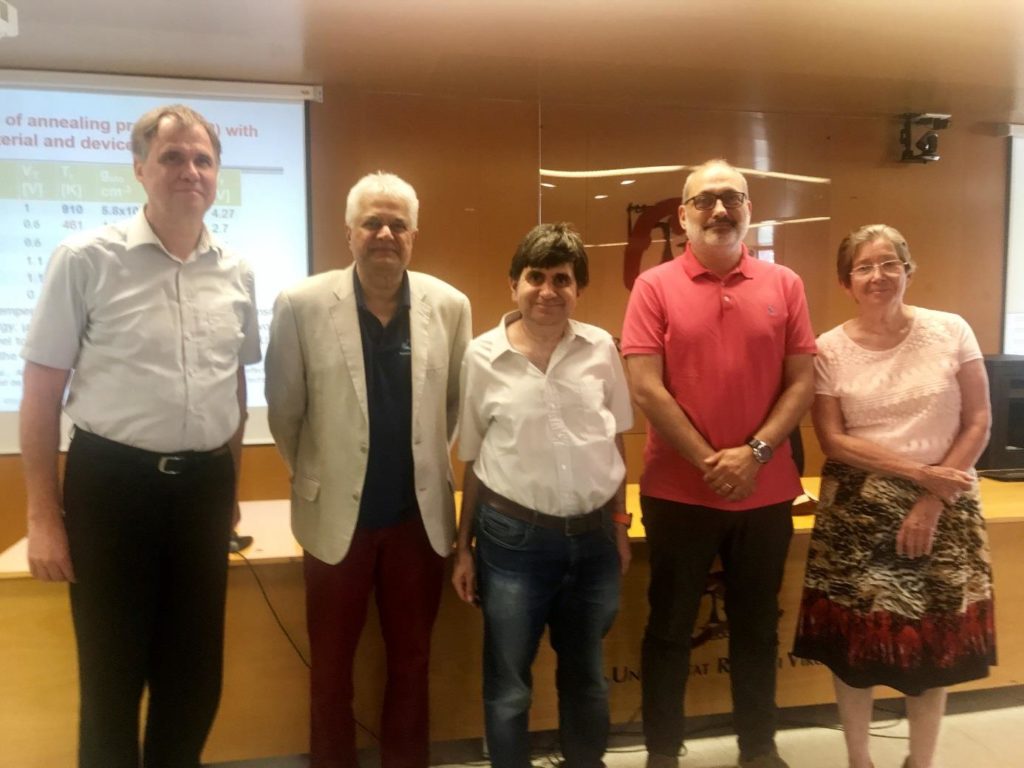Charla técnica sobre TFT y Flexible Electronics (MQ) organizada por IEEE-EDS
A Mini-Colloquium on TFT and Flexible Electronics was held at the Universitat Rovira i Virgili (URV) on July 11th in Tarragona Spain. The MQ was hosted and organized by the DEEEA department of the URV under the supervision of Prof. Benjamin Iñiguez (Chair of the ED Spain Chapter) and Prof. Lluis Marsal.
Invited Distinguished Lecturers of the MQ were Prof. Achim Burghartz, Dr. Arokia Nathan, Prof. Magali Estrada, Prof. Lluis Marsal.
After a refreshment of approximate 30 minutes, the MQ started at 10:50 o´clock by an introduction of Prof. Benjamin Iñiguez.
Afterwards, Prof. Achim Burghartz from IMS Chips (Stuttgart, Germany) held an inspiring lecture on the topic of „Ultra-Thin Si Chips -A New Paradigm in Silicon Technology“. He was discussing issues in ultra-thin chip fabrication, device modeling and circuit design, as well as assembly and interconnects for thin chips embedded in foil substrates. Numerous distinct differences to conventional silicon technology justify the statement that ultra-thin chips features a new paradigm in silicon technology.
Next, Dr. Arokia Nathan from Cambridge Touch Technologies (Cambridge, UK) shared his experience on the „Transparent and Flexible Nano-Electronics for Organic Displays and Ultralow Power Sensor Interfaces“. The lecture investigated the transistor operation in the different regimes, and review device properties when operated in the deep sub-threshold regime or in near-OFF state, addressing the pivotal requirement of low supply voltage and ultralow power leading to potentially battery-less operation.
After the lunch the lecture „Fabrication Issues of Amorphous Oxide Semiconductor Thin Film Devices“ by Dr. Prof. Magali Estrada from CINVESTAV (Mexico) followed. The lecture gave insights on the fabrication process of high mobility, low operating voltage and low temperature processed AOSTFTs, where the semiconductor layer is Hf-In-Zn-O and the insulator HfO2 (HIZO/HfO2 TFTs), using spin-coated polymethyl-methacrylate (PMMA) as passivation and etch-stop layer (ESL). Furthermore, results of characterization of the fabricated devices were analyzed. Special attention was focused to the significant increase in mobility that can be obtained, reaching values even above 300 cm2/Vs.
The last lecture was held by Prof. Lluis Marsal on the topic of “Current progress and future perspectives in polymer solar cells”. The lecture Prof. Marsal outlined the perspectives and recent advances made in polymer solar cells, design and synthesis of new polymers and in particular the active layer morphology, interfacial layers and stability. Additionally, the basic device operation and various parameters limiting their efficiency and their possible solutions were discussed.

